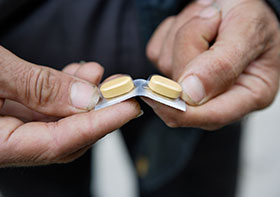HIV/AIDS epidemic in Europe: HIV treatment and care

WHO/Marcus Garcia
WHO expert on HIV treatment
WHO/Europe helps countries, particularly low- and middle-income countries in the eastern part of the WHO European Region where 76% of new HIV infections are reported, to reach the goal of universal access to HIV prevention, treatment, care and support. Treatment and care for people living with HIV must be an integral part of a comprehensive and appropriate response to the HIV epidemic.
Treatment with antiretroviral drugs:
- delays the progress of the disease
- reduces disability
- improves quality of life
- increases life expectancy
- prevents the transmission of HIV to others.
In 2013, WHO issued consolidated guidelines on the use of antiretroviral drugs for treating and preventing HIV infection and, in 2014, guidelines on HIV prevention, diagnosis, treatment and care for key populations. Together they offer a public health approach to scaling up treatment and containing HIV transmission.
Progress in providing HIV treatment and care
Countries in the Region have made significant progress in delivering HIV treatment and care to people living with HIV, including improved testing and counselling, laboratory monitoring and delivery of services.
ART use has been scaled up in the east, with 70 000 more patients receiving treatment in 2012 than in 2010. ART coverage increased from 23% (129 000) in 2010 to 35% (199 000) in 2012. This falls far short of the European coverage target of 80% by 2015. In the west, ART coverage is high, with 560 000 patients on ART in 2012, and most western European countries achieved or are on track to reach the 80% coverage target by 2015.
WHO’s support to European countries
The Regional Office supports Member States in adapting and implementing WHO’s “Consolidated guidelines on the use of antiretroviral drugs for treating and preventing HIV infection”. This support includes technical consultations and input to the development of national plans that take account of the new WHO recommendations, evaluationof existing ART services and advice on how to optimize ART service delivery.
In addition, WHO/Europe designated a new Collaborating Centre on HIV and Viral Hepatitis at the University of Copenhagen, Denmark.The Centre provides technical support, primarily to countries in central and eastern Europe and central Asia.
Progress report for 2014 Regional Committee
The 2011 WHO Regional Committee for Europe adopted the European Action Plan for HIV/AIDS 2012–2015 and requested the WHO Regional Director for Europe to report on its implementation to the2014 session. The report will describe the progress made and challenges remaining.



